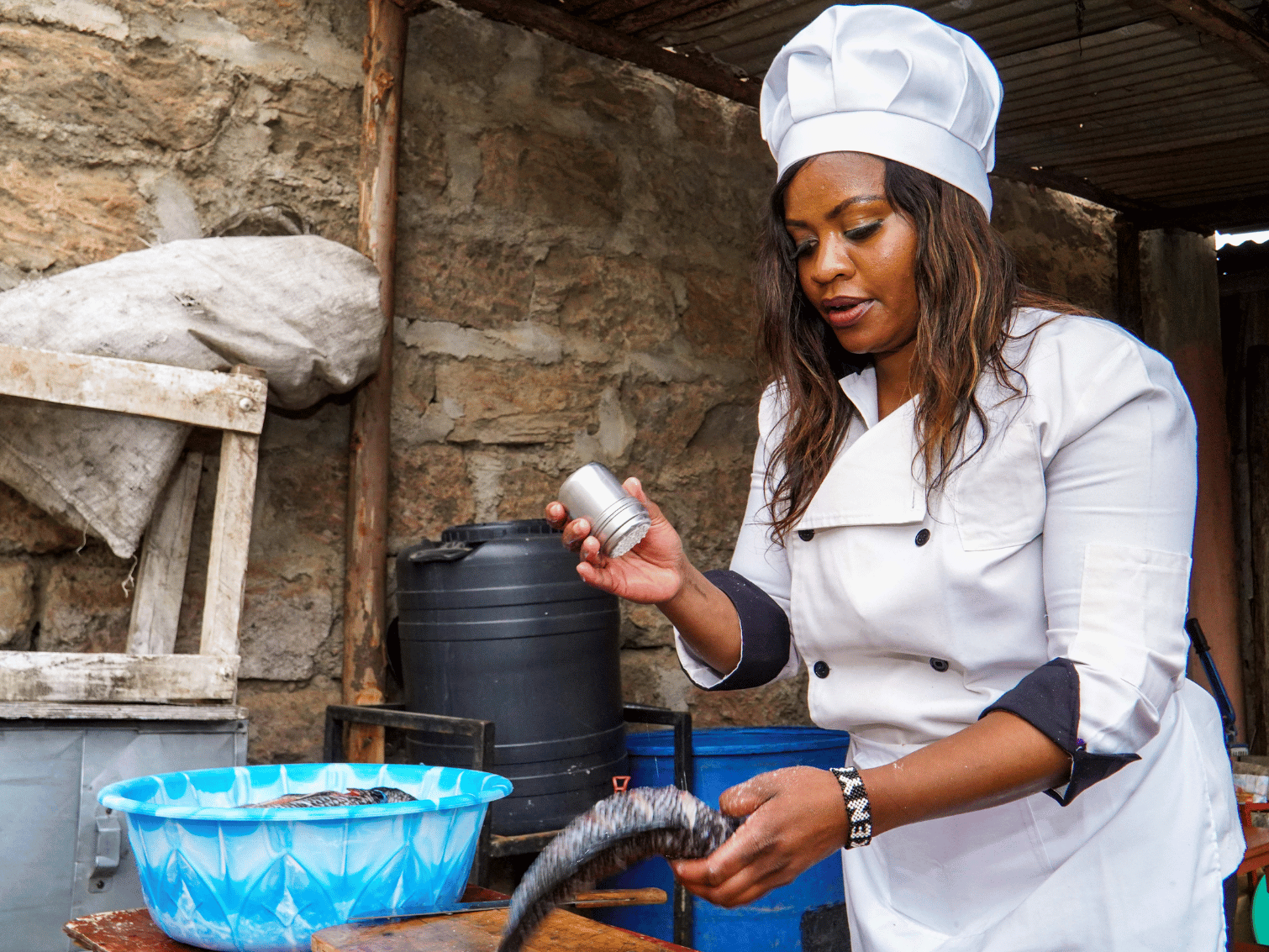Visa and Hand in Hand project helps women scale up their businesses in Nairobi’s most deprived communities
09 Mar 2023

After taking part in the training fish seller Damiana boosted her profits by 70%.
Participants saw an average income uplift of USD $156 per month, despite the Covid-19 crisis, with more than 80% reporting improved financial management skills.
Hand in Hand’s Kenya Micro-Enterprise Success Programme (KMES) project, funded by Visa Inc., has delivered unprecedented results, with entrepreneurs typically increasing their incomes by USD $156 per month, despite the Covid-19 pandemic.
The project is the first of its kind to target existing small business owners as well as first-time entrepreneurs. Delivered in Nairobi’s informal settlements, which the UN describes as “some of the most dense, unsanitary and insecure slums in the world,” the project aimed to boost local economies, create jobs, and lift families out of poverty.
The three-year programme provided 8,200 first-time entrepreneurs (6,560 of them women) living below the poverty line with the core business training they needed to start their own micro enterprises. It also provided ‘advanced’ training to 1,600 people (1,280 of them women) who wanted to scale up their businesses, as part of its ‘acceleration’ cohort.
But, just months after the project began, Kenya was hit by its first wave of coronavirus cases, and the country locked down. For Kenyans, the pandemic wasn’t just a health crisis, it was an economic crisis as well – devastating livelihoods and pushing millions of families below the poverty line.
Despite this – the programme achieved remarkable success. Across the project, more than 80% of participants reported improved financial management skills. And, both first-time entrepreneurs and existing small businesses said they were now more financially resilient. This resilience played a crucial role in helping participants to weather the economic effects of Covid-19 pandemic — which, at the height of the crisis, saw 20% of Kenyans selling assets, 24% relying on loans to get by and over 40% skipping meals (World Bank.) However, thanks to the training, 90% of participants on the KMES programme reported that they would be able to withstand a financial shock without having to sell an asset or get into debt.
Overall, over the course of the project, first-time entrepreneurs increased their profitability by an average of 15%, earning an additional USD $150 a month. When the existing small businesses owners joined the programme they were typically making a small loss on each product sold. After taking part in the programme, they boosted their businesses’ profits by an average of 95%, earning an additional USD $192 a month.
All programme members received business and financial training, with existing small business owners being given additional mentoring and support to help them scale up their businesses. This included training in social media and digital marketing, and support to help them link up with larger markets and to access credit.
As a result of the business and financial efficiency training they’d received from Hand in Hand, programme members were able to act quickly to cut their costs, with participants in the ‘acceleration’ cohort seeing an average cost reduction of 43%. It was these cost savings that enabled entrepreneurs’ small businesses to remain operational throughout the pandemic, despite lockdowns which wiped out a third of the country’s micro and small businesses (Central Bank of Kenya.)
Being able to rapidly move their businesses online also played a key part in the entrepreneurs’ success. Many began to market their products on social and digital platforms during the pandemic, and the number of businesses taking mobile payments rose from 38% to a staggering 81%.
As the entrepreneurs’ businesses grew, so too did their ability to create jobs within their communities. Existing small businesses owners in the ‘acceleration’ cohort of the programme created 0.66 jobs per business, with first-time entrepreneurs creating jobs at a rate of 0.45 per business.
The programme also increased women’s decision making power, with 60% more first-time entrepreneurs reporting that they were now able to take part in decisions that affect their lives, such as household purchases, family visits and healthcare.
Eva Ngigi-Sarwari, Country Manager, Visa Kenya, said: “We are thrilled with the impact delivered by our partnership with Hand in Hand as not only did we surpass the number of targeted beneficiaries, but we have seen the immediate impact on their businesses.
“We will continue to seek out partnerships and opportunities that reach those traditionally underserved, providing them with access to resources that can help improve their economic livelihoods, businesses and communities.”
Hand in Hand Eastern Africa CEO, Albert Wambugu said, “At a time when businesses across the country were closing in record numbers these our members from Nairobi’s informal settlements were able to reduce their costs, expand into new markets and take their businesses online.
“Additionally, this project gave our members a path to digital financial inclusion, with a majority of entrepreneurs being able to access useful and affordable financial products and services that meet their needs, thus reducing poverty, unleashing their potential and boosting prosperity. Truly, we are grateful to Visa for their support.”
Hand in Hand International CEO, Dorothea Arndt, said: “This project equipped women with skills not only to get through the Covid-19 crisis but to create thriving enterprises. Women entrepreneurs in these extremely poor informal settlements have the odds stacked against them. Not only are they more likely to be digitally excluded, it’s often much harder for them to access credit.
“Thanks to this project with Visa Inc. these women have been able to confound expectations and succeed as entrepreneurs, even in the midst of a global pandemic. As a result of the training – which included social media marketing skills and support to access credit, they’ve been able to expand their businesses and lift their families out of poverty for good. What’s more, many of them are now employers, creating much-needed jobs in their communities.”
